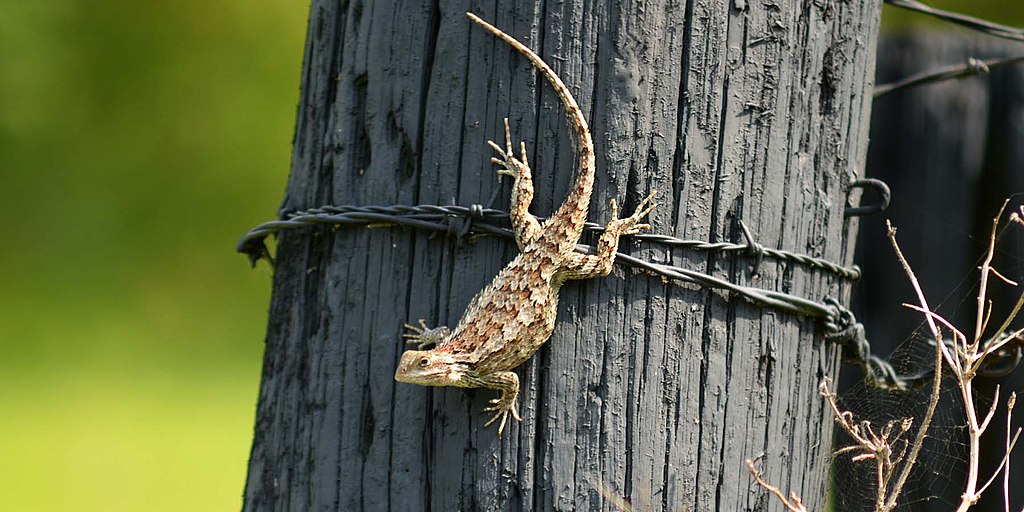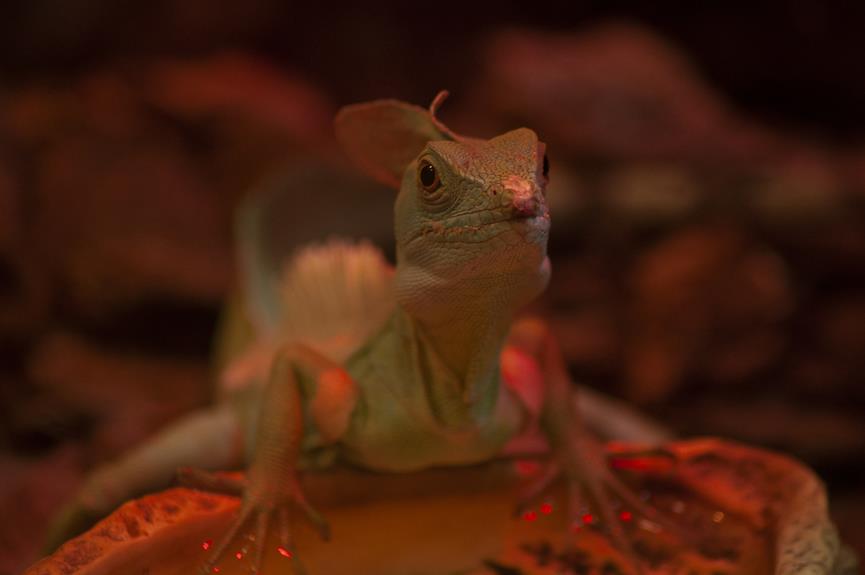Leopard geckos are a beloved pet that can bring color and vibrancy into your home. As an owner, you want to provide the best care possible for your new friend. As such, it is important to understand what they should eat. One food item you may be wondering about is cockroaches – can leopard geckos eat them? This article will explore the benefits and dangers of feeding cockroaches to your leopard gecko as well as alternatives for those seeking other options. With this knowledge, you can create a diet that keeps your leopard gecko healthy and happy.
Key Takeaways
- Feeding cockroaches to leopard geckos provides balanced nutrition with protein, calcium, and essential vitamins and minerals.
- Different types of cockroaches, such as Dubia Cockroaches, Giant Cave Roaches, and Turkistan Roaches, offer varying nutritional value, and the Dubia roach is a popular choice due to its excellent nutrition requirements for leopard geckos.
- When feeding cockroaches to leopard geckos, it is important to use forceps or tweezers to handle the insects, provide the appropriate size and quantity of roaches per meal, securely contain live feeder insects, and remove any uneaten food after 15 minutes to prevent gastrointestinal problems.
- While there are benefits to feeding cockroaches to leopard geckos, there are also dangers to consider such as the potential for parasites, disruption of gut flora, and the introduction of parasites from wild-caught cockroaches if left untreated. Alternatives to cockroaches include breeding crickets, using mealworms, and occasionally giving wax worms as a treat.
Benefits of Feeding Cockroaches to Leopard Geckos
You can give your pet leopard gecko the nutrition it needs with cockroaches—it’s a win-win for both of you! Feeding cockroaches to your leopard gecko offers several nutritional advantages. Cockroaches are rich in protein, calcium, and other essential vitamins and minerals that your pet needs to stay healthy. This provides them with more balanced nutrition than commercial feeder insects like mealworms. Additionally, variety is beneficial for their diet; offering different types of food helps keep them stimulated, which can lead to longer lifespans compared to those eating only one type of insect.
Feeding cockroaches also has environmental benefits. These hardy insects have adapted to live outdoors in many parts of the world, so they don’t require any special conditions like certain temperatures or humidity levels as compared with other feeder insects. Furthermore, they reproduce quickly and require minimal care since they’re easy to grow yourself at home if you wish.
The next step is learning about the types of cockroaches suitable for feeding your gecko.
Types of Cockroaches Suitable for Feeding
| For feeding your pet, you’ll want to select cockroaches that are small, safe, and nutritious. When considering which type of cockroach to feed your leopard gecko, there are several factors to keep in mind. | Cockroach Type | Size | Nutritional Value |
|---|---|---|---|
| Dubia Cockroaches | 1-2 inches | High Protein & Fat Content | |
| Giant Cave Roaches | 2 – 3 inches | Low Fat Content but high Calcium Content | |
| Turkistan Roaches | 1 inch | Low calcium content but high protein and fat content |
These types of cockroaches vary in size and nutritional value as well as availability. The Dubia roach is a popular choice due to its excellent nutrition requirements for leopard geckos. It’s important to consider the feeding methods for each type of cockroach as some require you to dust them with calcium powder before providing them to your gecko while others may not need it at all. Additionally, knowing the nutritional value of each type of insect can help guide your decision on what kind of food will best suit the needs of your pet. Ultimately, these decisions come down to personal preference and both giant cave roaches and Turkistan roaches can provide beneficial vitamins and minerals for a healthy diet for your leopard gecko. Selecting the right kind of insect is only half the battle; you also need to know how often and how much should be fed in order for it to be a complete diet for your reptile companion.
How to Feed Cockroaches to Your Gecko
Feeding your pet cockroaches is more than just providing them with sustenance; it’s also an opportunity to create an enriching experience for your reptilian companion. To ensure that the feeding process is as safe and enjoyable as possible, it’s important to familiarize yourself with the best techniques for serving cockroaches to your leopard gecko. When handling them, be sure to use forceps or tweezers to pick up the insects—avoid touching them directly if possible. As for portion size, a single adult-sized roach is usually enough for one meal. For smaller geckos, you can provide two smaller roaches per meal.
When offering cockroaches as live feeder insects, make sure they are contained in a secure enclosure so they can’t escape or harm your gecko. You should also remove any uneaten food after 15 minutes of feeding time has elapsed. This will help prevent any potential gastrointestinal problems due to overconsumption of food items by your gecko. With these guiding principles in mind, you’ll have everything you need to provide healthy meals of cockroaches for your leopard gecko! Now that we’ve discussed how best to feed these insects safely and effectively, let’s move on and explore the next step: learning about potential dangers associated with consuming such prey items.
Dangers of Feeding Cockroaches to Leopard Geckos
It’s important to be aware of the potential dangers associated with feeding cockroaches to your pet, as research has shown that up to 10% of wild-caught roaches can carry parasites. Feeding cockroaches to leopard geckos can present several risks:
- Nutrients – Mealworms are a better source of nutrients for your gecko than cockroaches because they contain higher levels of calcium and phosphorus which are essential for a healthy diet.
- Gut Flora Balance – Regularly feeding your gecko cockroaches can disrupt the balance of their gut flora, leading to digestive issues like diarrhea and constipation.
- Parasites – As mentioned above, wild-caught cockroaches could potentially introduce parasites into your gecko’s system which could lead to serious health problems if left untreated.
In order to keep your pet safe and healthy it is important that you take the necessary precautions when considering adding cockroaches into their diet. Make sure you make an informed decision by researching the nutritional content of both mealworms and roaches before making any decisions on what food is best for them! Keeping these risks in mind, let’s look at some alternatives to feeding cockroaches to leopard geckos that provide all the same benefits without any of the drawbacks.
Alternatives to Cockroaches for Leopard Geckos
Rather than feeding cockroaches, there are various other alternatives that can provide leopard geckos with the same benefits without any of the drawbacks. Breeding crickets is a great way to provide your gecko with a balanced diet and prevent nutritional deficiencies. Crickets are readily available and tend to be less expensive than some other feeder insects. Mealworms are another good alternative for leopard geckos – they have a soft exoskeleton and high calcium content, making them easy to digest. Additionally, mealworms can be stored in the refrigerator for several months if you buy them in bulk, which is an economical option.
| Insect | Nutritional Benefits |
|---|---|
| Crickets | High in protein and low fat; Good source of calcium; Readily available |
| Mealworms | Soft exoskeleton makes them easy to digest; High in calcium content; Can be stored for months if bought in bulk |
Finally, wax worms are also considered a good choice as a treat for leopard geckos due to their high fat content and taste. However, it’s important to remember that wax worms should only be given as an occasional snack rather than as part of their regular diet since they’re too fatty for long-term consumption. By offering your leopard gecko these nutrient-rich alternatives instead of cockroaches, you can ensure that they get all the nutrition they need while avoiding any potential risks or danger associated with feeding Cockroaches.
Frequently Asked Questions
How often should I feed cockroaches to my leopard gecko?
When meal planning for your leopard gecko, it’s important to provide variety. Feeding cockroaches now and then can be beneficial, but should not be the only source of nutrition. Aim to feed a variety of prey items in order to ensure your pet is getting the necessary nutrients. Compassionately caring for your gecko will help keep them healthy and happy.
What size of cockroach should I feed my leopard gecko?
When it comes to feeding your leopard gecko cockroaches, meal planning is key! Make sure you choose a size that won’t be too big or small. Gut loading the cockroaches also helps ensure your pet’s nutritional needs are met. Serve with compassion and care – you’ll be doing right by your beloved leo!
How do I know if my leopard gecko is getting sufficient nutrition from cockroaches?
To ensure your leopard gecko is getting sufficient nutrition from cockroaches, plan their meals carefully and strive for a dietary balance. Monitor their health and behavior to recognize any signs of nutritional deficiency. With careful meal planning, you can ensure they get the nutrients they need.
Are there any special considerations for feeding cockroaches to baby leopard geckos?
When breeding cockroaches for your baby leopard gecko, handle with safety in mind. Consider the size and age of the gecko when determining how much food to offer. Provide a variety of feeder insects to ensure complete nutrition. Show compassion for your pet’s health needs by observing their eating habits.
Are there any other food sources that can supplement cockroaches for leopard geckos?
You’re in luck! In addition to cockroaches, leopard geckos can also benefit from commercial diets and other live insects. Figuratively speaking, your gecko’s menu is as varied as a buffet. Be sure to offer variety and monitor for proper nutrition – your pet will thank you!
Conclusion
Yes, leopard geckos can eat cockroaches! They provide a great source of protein and other essential nutrients that your gecko needs. However, you must be sure to take the necessary precautions to prevent any potential dangers associated with feeding cockroaches to your pet. If you don’t feel comfortable doing so, there are plenty of other alternatives out there that will keep your gecko healthy and happy as a bug in a rug.

